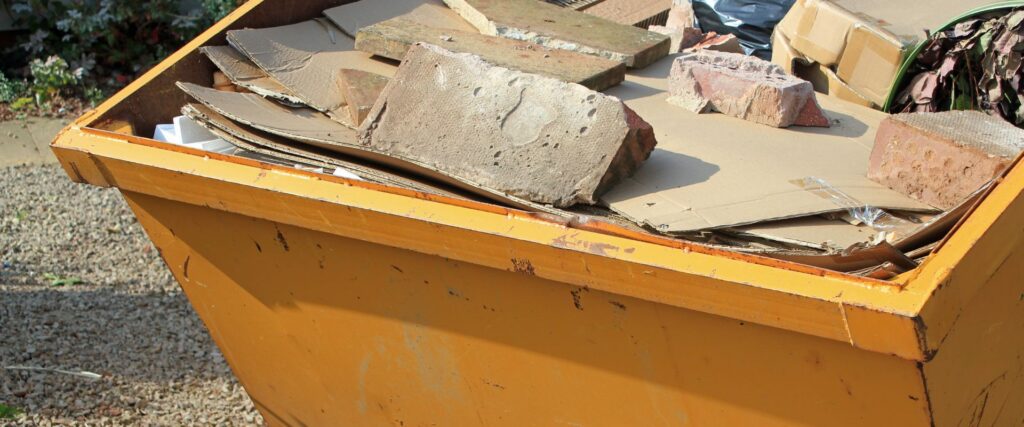Are you planning a renovation or decluttering project in the UK? Before you start, it’s vital to understand the regulations surrounding skip hire in residential areas. Non-compliance can lead to hefty fines and legal issues.
This comprehensive guide covers all aspects of skip hire regulations, ensuring you are properly prepared.
Just like following traffic rules keeps everyone safe on the road, adhering to skip hire regulations guarantees a smooth and hassle-free waste disposal experience.
From permits and licensing requirements to placement restrictions, waste disposal rules, size limits, and environmental considerations – we’ll cover it all.
By understanding these regulations, you can confidently and responsibly navigate the process. Hiring a reputable skip provider is also essential for compliance.
Let’s dive in and become masters of skip hire regulations in residential areas across the UK!
Permits and Licensing Requirements
Before you start any skip hire in a residential area, it’s essential to understand the relevant permits and licensing requirements. You must get a permit application from your local council. This outlines the specific guidelines and regulations for placing skips in residential areas. It’s important to read and understand these requirements carefully before starting the skip hire project. Otherwise, you may be subject to fines or penalties.
The permit application may include details about skip size limits, placement restrictions, and the duration of the permit’s validity. By obtaining the correct permits and following all legal requirements, you can avoid any potential problems during your skip hire project.
Now that you’re aware of the permit process, let’s move on to discussing placement restrictions in residential areas.
Placement Restrictions
Remember, when it comes to where you can put your skip, there are lots of rules to follow!
Placement restrictions in residential areas are in place to reduce neighbourhood impact and prevent noise pollution. The local council may have specific guidelines regarding the placement of skips on public roads or footpaths. Generally, skips should not obstruct pedestrian access or create safety hazards. It’s also important to consider nearby properties, ensuring that the skip does not cause inconvenience or block driveways. Some areas may require permits for skip placement on public property.
By following these regulations, you can make sure your skip is in the right spot without causing disruption to the community.
Now, let’s move on to waste disposal rules and how to get rid of your waste materials without any hassle.
Waste Disposal Rules
To ensure a clean and sustainable environment, it’s essential to understand the waste disposal rules in your area and take responsible actions.
Illegally dumping waste is not only damaging to the environment but also carries serious penalties. It is important to dispose of waste through authorised methods such as using skip hire services or taking it to an approved waste management facility.
Moreover, hazardous waste disposal requires particular attention and should never be mixed with regular household waste. Hazardous substances like batteries, chemicals, or asbestos must be dealt with individually and disposed of in accordance with specific regulations set by your local authority or environmental agency.
By adhering to these rules, you can help to maintain a safe and healthy residential area for everyone.
Moving on to the next section about size and capacity limitations…
Size and Capacity Limitations
You’ll be astounded by the limits on size and capacity when it comes to disposing of waste responsibly in the UK. Skip hire regulations in residential areas come with specific rules for skip sizes and weight restrictions. Here’s what you need to know:
- Skip sizes range from 2-yard skips to 40-yard containers, with the weight limits varying.
- Narrow roads or low hanging branches can restrict skip access and delivery in some residential areas.
- Plan the placement of your skip carefully to avoid obstructions or inconvenience to others.
- You may need a permit to place a skip on public property – check with your local authority.
- Note the weight restrictions imposed by skip hire companies – exceeding these can incur extra charges.
Knowing the size and capacity limitations is essential before hiring a skip.
Now let’s look at environmental considerations.
Environmental Considerations
When it comes to waste disposal, it’s essential to promote eco-friendly practices. Encouraging the use of skip hire services that prioritize recycling and reusing materials helps contribute to a more sustainable environment.
Recycling not only reduces the amount of waste that ends up in landfills but also conserves natural resources and decreases pollution. Reusing materials whenever possible further minimizes the environmental impact of waste disposal.
Promoting eco-friendly waste disposal practices
Implementing eco-friendly waste disposal practices not only has environmental benefits, but also demonstrates our commitment to sustainable living in residential areas in the UK. Following these simple steps can help to reduce your carbon footprint and promote a greener lifestyle:
- Composting: Composting is a great way to manage biodegradable waste such as food scraps and garden trimmings. Set up a compost bin or use a local composting site to turn organic waste into nutrient-rich soil for your garden.
- Choose biodegradable: Opt for biodegradable options where possible, like paper bags instead of plastic or biodegradable cleaning products. This reduces the amount of non-biodegradable waste sent to landfill.
- Recycle and reuse: Instead of throwing away items, find ways to recycle or repurpose them. Donate old clothes and furniture, recycle paper and plastics, and consider upcycling projects to give new life to old materials.
By adopting these eco-friendly practices, we can help create cleaner, more sustainable residential areas in the UK, while reducing our impact on the environment. Let’s now explore recycling and reusing materials without delay.
Recycling and reusing materials whenever possible
Now that you understand the importance of promoting eco-friendly waste disposal practices, it’s time to look at recycling and reusing materials as much as possible. Waste reduction is a key part of sustainable practices, and by recycling and reusing materials, we can lower the amount of rubbish sent to landfill.
Recycling involves changing waste materials into new products, while reusing involves using items again for their original purpose or giving them a new use. Doing this helps us save resources, use less energy, and lower pollution from making new products. Also, recycling and reusing promote a circular economy, meaning we use materials over and over again.
The following section about hiring a reliable skip provider will provide further instruction on how to put these practices into action.
Hiring a Reputable Skip Provider
To find a reliable skip hire provider in the UK, start by considering the size of skip you need. Compare prices from different providers and consider the quality of service on offer.
Look for a provider with a good reputation, well-maintained skips, and adherence to relevant regulations. Reading customer reviews can help you assess their reliability and customer satisfaction.
Taking these steps will ensure you hire a reputable provider that meets your needs and respects the regulations in residential areas.
Frequently Asked Questions
Are there any specific regulations regarding the disposal of hazardous waste in residential skip hire?
When it comes to the disposal of hazardous waste in residential skip hire in the UK, there are specific regulations to follow. These regulations ensure the safe handling and disposal of hazardous materials, protecting both the environment and public health.
Strict guidelines govern the collection, transportation, and final disposal of hazardous waste. Adhering to these regulations is essential to prevent any potential harm or contamination that could result from improper methods of disposal.
What are the penalties for not obtaining the necessary permits and licenses for skip hire in residential areas?
If you fail to obtain the necessary permits and licences for skip hire in residential areas, there are penalties for non-compliance. Enforcement of these regulations is taken seriously to ensure safety and wellbeing of residents.
Penalties can include fines, court orders, or even imprisonment in severe cases. It’s essential to adhere to these regulations to avoid legal action and maintain a safe environment for all.
Is there a limit to the number of skips that can be placed in a residential area at one time?
In skip hire, as in life, balance is key. Although there’s no explicit limit to the number of skips that can be placed in residential areas at once, moderation is essential. Too many skips can detract from the appearance of the neighborhood and disturb the peace that its residents enjoy.
It’s recommended to consider the restrictions on skip placement and be aware of the potential impact of too many skips in residential areas.
Are there any restrictions on the types of materials that can be disposed of in a residential skip?
In the UK, there are restrictions on the types of materials that can be disposed of in a residential skip. It’s important to follow proper disposal practices.
Generally, household and garden waste such as furniture, appliances, and green waste are allowed. However, hazardous materials like asbestos, chemicals, and paint should not be put in the skip.
Additionally, it’s advisable to separate recyclable items from general waste for recycling.
What steps should be taken to ensure that the skip provider hired follows proper waste disposal practices?
To ensure that your hired skip provider follows proper waste disposal practices in the UK, you must actively monitor them for compliance with waste regulations. Keep a close watch on their actions and ensure that they are disposing of the waste in an environmentally friendly way.
Inspect the skip regularly to check that it’s being filled correctly and that no prohibited materials are being dumped. Remember, “Actions speak louder than words,” so stay vigilant to protect the environment and maintain proper waste management standards.











